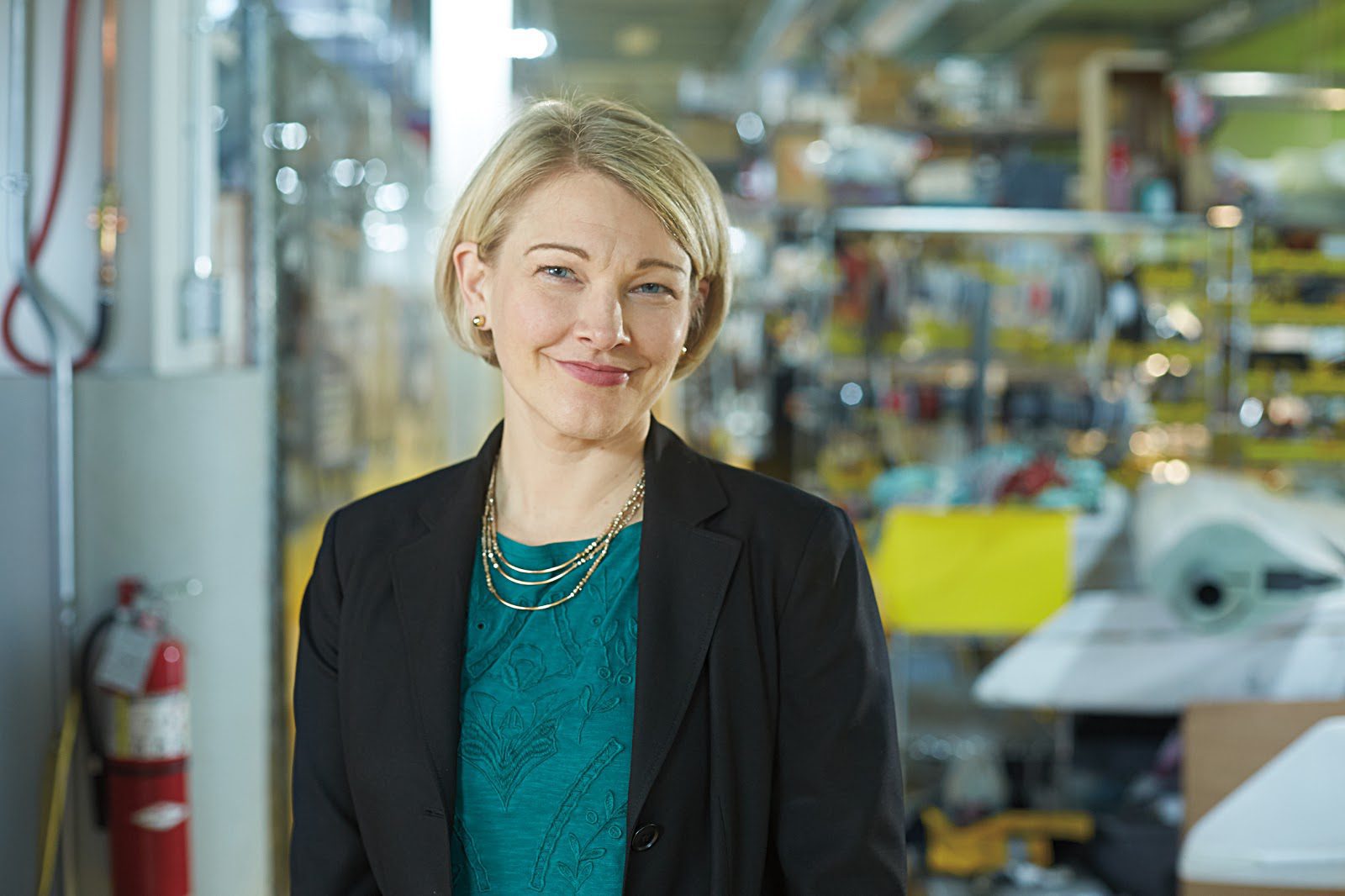She calls herself a climate optimist, and she’s in it to win it. At the helm of North America’s largest climate tech startup incubator, she’s seen 280 companies go from idea phase to full-blown venture and if we know anything about startups, that’s no small victory. Greentown Labs has more to celebrate than most, with an 86% startup survival rate, $900 million raised in funding, and over 6,500 jobs created. But for CEO Emily Reichert, it’s not just about the numbers. “Engaging with smart, passionate people, entrepreneurs who address climate change, when they have a win, it just lights up your day,” she told us. “All those hours of work made it possible for this small company to meet a milestone, or raise another round of funding, or complete a test that shows that their product works so that they can move towards scaling to address the big climate challenge around greenhouse gas emissions.”
It’s a lot to manage, 500+ Greentown members addressing massive climate issues under the same roof, but Reichert’s well-suited for the role. With a Ph.D. in physical chemistry and an MBA from MIT, she brought 15 years of R&D experience to Greentown, along with some mad skills in non-dilutive fundraising, marketing, partnerships, team building, strategic planning, and intellectual property. Starting out as a scientist for international management consulting firm Arthur D. Little, she moved up through R&D to business development and management. Five years in, she told Forbes, she couldn’t shake the question — “what impact am I having?”
She found the answer in the field of green chemistry, a practice that attempts to reduce waste and the use or generation of toxins. In essence, green chemistry works for the environment instead of inadvertently against it. Fully inspired, she launched a program for green chemistry at her job, and eventually joined a green chemistry-focused startup that grew to 42 people in two years. Little did she know that her newfound passion would eventually take her to Greentown.
It’s tough to be an entrepreneur, but it’s super tough to be an entrepreneur solving climate and cleantech problems.
“Becoming the first employee was an adventure. When I started, there wasn’t any clear idea of how one would get paid doing this job. It took about a year and a half, it was a bit of an entrepreneurial journey. And I’m so glad I did.” Reichert speaks fondly of early days at Greentown Labs when it was just four entrepreneurs and a handful of MIT grads grinding the gears of ingenuity in the basement of a warehouse in South Boston. It was 2012 and they were already ahead of their time. As the future of cleantech, they needed space to build and test the prototypes that would power today’s renewable energy revolution. But what they lacked in space, they made up for in the community. “When I came in, I could feel that vibe, that community, that spirit of supporting each other in what is a really tough thing to do. I mean it’s tough to be an entrepreneur, but it’s super tough to be an entrepreneur solving climate and cleantech problems.”
With the help of Mayor Joe Curtatone, Reichert took the first 25 companies from surviving to thriving in a spacious new lab in Somerville, Mass. “That was my first six months of my job basically — find a space, find a partner, find a home, find a construction contract to retrofit that space. Finally, we announced it to the world and had the mayor and the governor there, coincidentally, and opened the doors on September 23, 2013. In those first six months, we accomplished all of that and raised $1.5 million in the process.” Today Greentown Labs occupies 100,000 square feet of shining innovation space just off of Union Square. “We have the community and the convenience. And of course, technology is another really important part of what we do at Greentown Labs.”
That technology is taking Reichert to Houston, where she’s leading the expansion of Greentown’s second incubator and she couldn’t be more thrilled to tap the Texas energy pipeline. “The city of Houston has a long time economy that has been built on the more traditional types of energy. What I’m most excited about is bringing folks that are working in all aspects of energy along to be part of the energy transition. There’s so much talent there. There are so many strong universities, there are assets galore. There are people that know how to scale up technology, and all of that has got to be redeployed towards a decarbonized future.”
With her excitement comes a sense of urgency. “The climate crisis is in people’s everyday life. It’s hard to avoid wherever you live in the United States, whether there are floods in the Midwest, or hurricanes and major storms pummeling the South. The wildfires and bizarre orange skies that we saw in California and Oregon, bigger storms and more heat in the Northeast. No matter where you live, you’re already being affected.” That’s why she firmly believes that issues of climate transcend politics. “Everyone can get on board with the idea that we need to use our resources more efficiently, that we need to reduce the amount of energy that we use, the amount of water that we use, the amount of chemicals that we put into our environment. I think those are all principles that everyone agrees on. We need to make sure not to get stuck on words.”
This becomes less and less about politics and more and more about jobs, and an environment that is healthy where everyone can breathe.
Words like “clean,” “green” and “climate change,” can indeed trigger more polarized rhetoric, but for Reichert, that’s missing the point. “We need to reduce greenhouse gas emissions. We’re aiming to make all of these industry sectors, whether it be manufacturing, agriculture, building, or transportation, more efficient. That will address our overall climate challenge, plus have additional benefits of creating jobs and creating a cleaner environment for everyone.” She refers to the rapidly growing renewable energy and energy efficiency sectors across the United States, with over 3 million jobs and counting. “As those numbers grow, this becomes less and less about politics and more and more about jobs, and an environment that is healthy where everyone can breathe.”
Greentown Labs is hard at work creating that healthy environment both outside in the atmosphere and inside HQ, where Reichert’s positive energy suffuses the culture from high-level strategy to daily team meetings. “It’s how we start every single one of our team meetings and every team member contributes. [We ask] ‘what is good that is happening today? What are we going to celebrate? Who are we going to thank?’” For Reichert, it’s the best way to confront the enormity of the climate challenge. “You can be paralyzed by the idea that there’s nothing you individually can do and being at Greentown Labs, being immersed in the community, surrounded by this wonderful supportive system, tells you that you indeed can have an impact. What you do as an individual does matter.”
Check out the episode of the Consensus in Conversation podcast featuring Juliana Garaziar of Greentown Labs.





